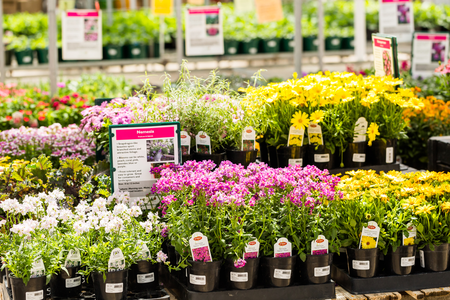How AI can help your garden centre
With the increasing popularity of online shopping and the growing interest in sustainable and eco-friendly practices, garden centres have been exploring ways to leverage technology to enhance their offerings and improve customer experience. Artificial Intelligence (AI) is one such technology that can help garden centres achieve these goals.
But before we jump into details, we have to explain what we mean by Artificial Intelligence in the first place! AI is the ability of machines to simulate human intelligence and perform tasks that typically require human intervention, such as learning, reasoning, problem-solving, and decision-making.
In the context of garden centres, AI can be used in a variety of ways to improve the customer experience, increase sales, and optimize operations. We will give you some ideas below. You can also rewatch our webinar about AI - click here!

1. Personalized recommendations
AI can be used to analyze customer data, including their purchase history, browsing behaviour, and demographic information, to provide personalized recommendations for products and services. For example, if a customer has previously purchased seeds for a particular type of plant, AI can suggest complementary products, such as fertilizers or gardening tools.
2. Inventory management
AI can be used to optimize inventory management by analyzing sales data, trends, and seasonal demand patterns. This can be combined with practical info like the weather forecast. This can help garden centres to ensure that they always have the right products in stock, avoid overstocking, and reduce waste. There are multiple software platforms available that can help you with this, just Google it!
3. Plant identification
AI can be used to identify plants based on photos, which can be helpful for customers who are not familiar with different types of plants or for garden centres that receive inquiries from customers about specific plants. AI-powered plant identification apps can also provide information about care, growing conditions, and pests and diseases.
Traditional plant identification tools rely on photo comparison, which means that you have to feed the tool to understand the problem. With AI, the software can use its’ knowledge to identify the problem rather than relying on a limited resource of photos.
4. Chatbots
AI-powered chatbots can provide customers with instant assistance, answering their questions and providing information about products and services. This can help to reduce waiting times and provide a more efficient and personalized experience for customers.
5. Predictive analytics
AI can be used to analyze data from various sources, including weather forecasts, social media, and sales data, to predict trends and identify opportunities. For example, if the weather forecast predicts a heatwave, AI can suggest products such as shade cloths or watering systems to customers.
6. Energy management
AI can be used to optimize energy consumption in garden centres by analyzing data on lighting, heating, and cooling systems. This can help to reduce energy costs, improve sustainability, and create a more comfortable shopping environment for customers.

7. Improved webshop photography
Packshots are product photos with a white background and are used to showcase individual products such as plants, garden tools, and accessories. Traditionally, packshots are created by photographers, who set up the product, adjust lighting and angles, and take multiple photos.
However, AI-generated packshots can be produced in a matter of seconds, using computer-generated images that are realistic and customizable.
8. Inspirational photos
AI can also generate inspirational images for garden centres. Inspirational images are typically used to showcase different garden designs, landscaping ideas, and outdoor living spaces. Traditionally, these images are created by professional photographers and designers, who work together to create a visually appealing scene. However, AI can now generate inspirational images that are customizable and adaptable.

9. Complaint handling
Dealing with online complaints can be a time-consuming and challenging task for garden centres, particularly as online shopping becomes increasingly popular. However, AI can help garden centres to manage online complaints in a more efficient and effective way. Just ask the chatbot to write a professional answer to the complaint and you’re good to go.
If you’re not sure this would work: research showed that AI-generated replies on medical questions are more friendly than human-written responses!
Challenges
There are also some potential challenges that garden centres may face when implementing AI solutions. One challenge is the cost of implementing AI technology, which can be expensive, especially for smaller businesses. The cost of hardware and software, as well as the need to hire experts to develop and maintain the AI system, can be a significant barrier for some garden centres.
Another challenge that garden centres may face is user adoption. While AI-powered chatbots and personalized recommendations can improve the customer experience, some customers may prefer traditional forms of communication or may be hesitant to share their personal information with AI systems.

Leverage AI technology
In conclusion, AI has the potential to revolutionize the horticulture industry by providing garden centres with the tools they need to improve customer experience, increase sales, and optimize operations.
By leveraging AI technologies, garden centres can stay ahead of the competition and provide their customers with the best possible experience. And that’s what it’s all about, isn’t it? Don’t forget to check out our webinar about AI - click here!
NB. Just in case you’re wondering: 80% of this article is AI written, and all images are AI-generated. We used the style of director Wes Anderson for the first 2 photos, photo-realistic options for the 2 with houseplants, and for the last one, we just asked for a typical British garden.



